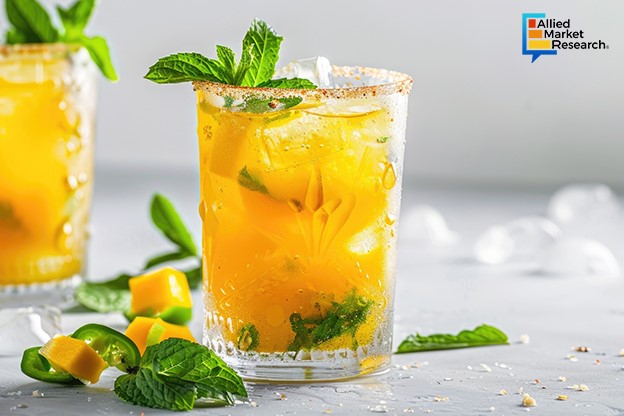A Look into Innovative Non-Alcoholic Drinks Meeting Emerging Consumer Demands

11 Feb
2025
Highlights:
- An introduction to non-alcoholic drinks
- New types of alcohol-free beverages
- Innovative product launches by key players in 2025
- Profitable acquisitions in the domain
In the last three years, the growing preference for no- and low-alcohol beverages has driven a surge in the global popularity of non-alcoholic drinks. Several restaurants and bars have started incorporating dedicated non-alcoholic cocktail menus and a wider selection of sophisticated non-alcoholic spirits, beers, fermented drinks, and aperitifs.
In a recent survey, almost 55% of the most influential bartenders in London, Los Angeles, and New York believe that the demand for non- and low-alcoholic beverages is expected to increase in the next 12 months. Moreover, 83% of bar managers in Los Angeles think non-alcoholic cocktails are part of a growing trend, with over 40% of restaurants in Los Angeles now offering a non-alcoholic specific drinks menu.
Popular varieties of non-alcoholic drinks
The non-alcoholic drinks industry is experiencing a surge in innovation, driven by health and wellness trends, and a growing demand for sophisticated and flavorful alternatives to traditional alcoholic drinks. For instance, crafted mocktails are specialized drinks that utilize premium ingredients like organic juices and exotic herbs to mimic the experience of traditional cocktails without alcohol. Moreover, the rising awareness of wellness among individuals has increased the demand for herbal infused drinks. These beverages feature ingredients such as chamomile and lavender, offering unique flavors and potential health benefits.
Furthermore, functional beverages have become more popular among today’s consumers. They are enriched with vitamins, minerals, probiotics, and adaptogens, offering added health benefits such as gut health, stress relief, and mental clarity. For instance, these drinks include kombucha, turmeric lattes, and CBD-infused water. These functional drinks are designed with specific purposes and benefits, catering to various needs of people including energy, beauty, essential vitamins, and minerals. On the other hand, with the rise in veganism and lactose intolerance awareness, plant-based drinks like almond, oat, soy, and coconut milk-based beverages are creating waves across the industry.
Mash Gang and J.Lohr’s pioneering products based on growing consumer behavior
In January 2025, Mash Gang, a no and low alcohol craft beer company, introduced three non-alcoholic beers, namely, a mango IPA, a classic cerveza, and a chocolate cherry shout. The company has reimagined the classic Cerveza with a modern twist called Glug. This drink includes a touch of corn and is light and boldly refreshing. On the other hand, mango IPA is a thick juice that showcases Mash Gang’s expertise in sweet, sour, and spicy flavors. It is a playful and flavor-packed drink that is ideal for city strolls, scenic hikes, and outdoor roaming. Moreover, its new chocolate cherry stout, viz, Lesser Evil, offers a luxurious winter treat that includes decadent chocolate, creamy oats, and sweet-sour cherry juice.
Simultaneously, in January 2025, J. Lohr Vineyard & Wine, a wine-making company, announced its new alcohol-removed wine brand, ARIEL Vineywards. With this launch, the company aims to cater to a broader audience of modern consumers seeking Chardonnay and Sauvignon wines without alcohol.
La Petite and Lyres collaborated to elevate the non-alcoholic cocktail experience
In January 2025, La Petite Maison, a French restaurant group, partnered with Lyres, a renowned non-alcoholic spirit's brand. Through this acquisition, La Petite achieved 76th rank on the world’s 50 best bars because of its continuous emphasis on innovating and elevating bar programs through collaborating with like-minded brands such as Lyre. Moreover, under this agreement, the firm planned to participate in Dry January, an initiative organized by Alcohol Change UK, this year by introducing a new non-alcoholic cocktail menu at its restaurants in London, Miami, Dubai, Hong Kong, Limassol, and Riyagadh. According to Karl Fielding, the VP of Lyre, the companies together aim to create a wide range of non-alcoholic cocktails for guests attending the successful party of their collaborations last year.
Wrapping up
The non-alcoholic beverage industry highlights a significant transition in consumer preferences, driven by an increasing number of health-conscious people, lifestyle changes, and the rising availability of alcohol-free alternatives. Furthermore, the expansion of online platforms and direct-to-consumer sale models is expected to create wider growth opportunities for non-alcoholic beverage brands in the coming years.
To gain more insights into the latest trends in the non-alcoholic industry, feel free to talk to our industry analysts today !

Koyel Ghosh
Author’s Bio- Koyel Ghosh is a blogger with a strong passion and enjoys writing in miscellaneous domains, as she believes it lets her explore a wide variety of niches. She has an innate interest in creativity and enjoys experimenting with different writing styles. A writer who never stops imagining, she has been serving the corporate industry for the last five years.
Avenue: Entire Library membership of Allied Market Research Reports at your disposal
- Avenue is an innovative subscription-based online report database.
- Avail an online access to the entire library of syndicated reports on more than 2,000 niche industries and company profiles on more than 12,000 firms across 11 domains.
- A cost-effective model tailored for entrepreneurs, investors, and students & researchers at universities.
- Request customizations, suggest new reports, and avail analyst support as per your requirements.
- Get an access to the library of reports at any time from any device and anywhere.
Related Post
-
How are Submarine Cables Transforming Global Connectivity with Enhanced User Experience?
-
Endoscopy Procedures: Transformations in Techniques and Applications
-
AI-Powered Video Analytics: How the Product Actually Works for enterprises
-
Painting Robots: Transforming Precision Coating and Creative Applications
-
Innovations in Pharmacovigilance Systems Advancing Patient Safety
-
Understanding Edge Security: Keeping Data Safe Near the Source
-
Exploring the Use and Advancements of 3D Laser Scanners in Professional Applications
-
Reinforcing Industrial Controls with Smarter Tools and Training








